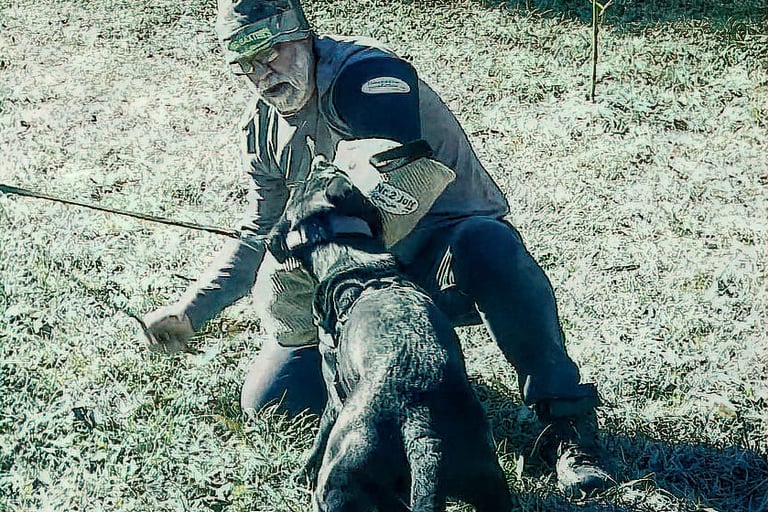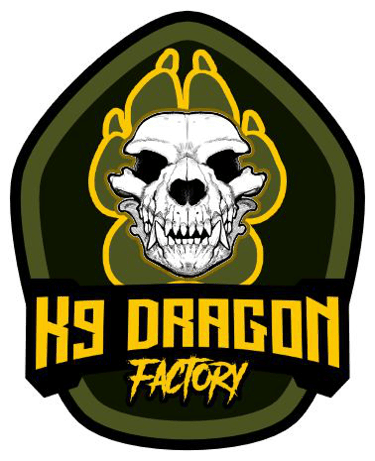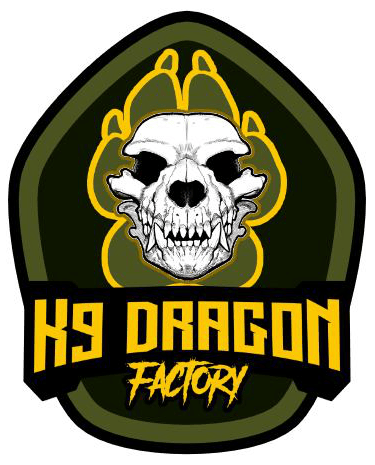NEW TSHIRTS AND K9 DRAGON FACTORY BRAND CLOTHING
Civil agitation is a crucial component in training a protection K9. Here are some reasons why it's essential:
1. Realistic Training Scenarios:
Civil agitation exposes the dog to realistic scenarios where they must discern genuine threats from non-threatening situations. This helps ensure that the dog reacts appropriately in real-world situations.
2. Building Confidence:
Facing a variety of controlled threats helps build a dog's confidence. The dog learns to stay composed and effective under pressure, which is vital for a reliable protection K9.
3. Controlled Aggression:
It teaches the dog to exhibit controlled aggression. The dog learns to target specific threats while remaining calm and focused, rather than becoming indiscriminately aggressive.
4. Desensitization to Stress:
Civil agitation helps desensitize dogs to stress and unusual situations, ensuring they can perform their protective duties without hesitation or fear, even in chaotic environments.
5. Improved Decision Making:
Through civil agitation, dogs learn to make better decisions when confronted with potential threats, distinguishing between actual dangers and false alarms.
6. Enhanced Handler-Dog Bond:
Working through civil agitation exercises strengthens the bond between the dog and its handler. The dog learns to trust and rely on the handler's cues, enhancing teamwork and effectiveness.
7. Safety and Control:
It ensures that the dog will respond correctly to commands during high-stress situations, which is critical for the safety of both the dog and others.
8. Testing and Refining Skills:
Civil agitation allows trainers to test and refine a dog's protection skills, ensuring the dog is fully prepared and effective in its role as a protection K9.
By incorporating civil agitation into training, you ensure that your K9 is not only capable of protecting but does so in a controlled, confident, and reliable manner.


When selecting a candidate for a personal protection dog, several key qualities are essential to ensure the dog can effectively perform its duties. Here are some of the most important qualities to look for:
1. Temperament:
- Stable: The dog should have a stable temperament, not overly aggressive or timid, and should be able to handle various environments and situations calmly.
- Confident: A confident dog is more likely to react appropriately in high-stress situations and is less likely to become fearful or aggressive without cause.
2. Trainability:
- Intelligent: The dog should be intelligent and capable of learning complex commands and tasks quickly.
- Obedient: The ability to follow commands reliably is crucial. The dog should show a strong willingness to please its handler.
3. Physical Health:
- Robust Health: The dog should be in excellent physical condition, free from any genetic or chronic health issues that could impair its ability to perform.
- Strength and Stamina: Physical strength and stamina are necessary for the demanding tasks a protection dog may face.
4. Socialization:
- Well-Socialized: The dog should be well-socialized with people and other animals, ensuring it can distinguish between friends and potential threats.
- Adaptable: The dog should be able to adapt to different environments and situations without becoming overly stressed.
5. Drive:
- High Energy and Drive: A high level of energy and drive is important for a protection dog to stay engaged and perform its duties effectively.
- Strong Work Ethic: The dog should have a strong work ethic and enjoy tasks and challenges, making training sessions productive.
6. Protective Instinct:
- Natural Protective Instinct: The dog should have a natural instinct to protect its family or handler, which can be further developed through training.
- Balanced Aggression: The dog should exhibit a balanced level of aggression, capable of being assertive when necessary but also able to turn off aggression when appropriate.
7. Courage:
- Fearless: The dog should not be easily frightened or intimidated, ensuring it can stand its ground and protect when needed.
- Resilient: The dog should be resilient and able to recover quickly from stressful or challenging situations.
8. Bonding Ability:
- Strong Loyalty: The dog should be capable of forming a strong bond with its handler and family, ensuring a loyal and dependable protector.
- Affectionate: While protective, the dog should also be affectionate and trustworthy around its family members.
Selecting a dog with these qualities increases the likelihood of successful training and performance as a personal protection dog, ensuring the safety and security of its handler and their family.
Here's what some of our trainers say
”Definately the real deal dog trainer. He was able to reset my dog and teach him to be calm and focus in just a few minutes. Amazing”
- Clarice Turner
”Thank you so much for all of your help. I finally feel like I can handle Casey without my husband. Your leash class answered so many questions and our boy just loves you. We look forward to more training and learning all we can. ”
- Brian Moten


